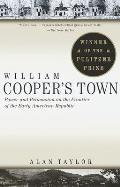This is the latest in a series of annual A.A.S. lectures featuring leading historians looking back on important works. And in early American history you can’t get more leading than Taylor. As for the book, it won both the Pulitzer and Bancroft Prizes, so that’s pretty important.
The event descoption says:
When the book William Cooper’s Town: Power and Persuasion on the Frontier of the Early American Republic appeared in 1995, it deftly combined social history, biography, and literary analysis to explore the business and political career of James Fenimore Cooper’s father and the development of the western New York frontier region of Otsego County.Taylor is currently the Thomas Jefferson Memorial Professor of History at the University of Virginia. His other books include Liberty Men and Great Proprietors: The Revolutionary Settlement on the Maine Frontier 1760–1820 (1990), which follows Henry Knox after the war; Writing Early American History (2005); The Divided Ground: Indians, Settlers, and the Northern Borderland of the American Revolution (2006); The Civil War of 1812: American Citizens, British Subjects, Irish Rebels, and Indian Allies (2010); The Internal Enemy: Slavery and War in Virginia (2013); Thomas Jefferson’s Education (2019); and the ongoing series of overviews American Colonies (2001), American Revolutions (2016), and American Republics (2021).
The book charts the rise and fall of the elder Cooper’s financial and political fortunes and examines how these impacted the literary ambitions and career of his son. It also describes the shifting political landscape as the nascent nation developed and then redefined ideals of republican gentility and democratic power.
In this talk, Alan Taylor will examine the genesis of this book and its impact on scholarship and society since it was first published.
Among his colleagues, Taylor is known for his plentiful output of books and his choice not to use social media. These things may well be related.
One aspect of William Cooper’s Town that really struck me came toward the end when Taylor argued that Cooper’s success in establishing his New York community and becoming famous for it was all a matter of lucky timing. Other men had tried to found towns in the same region before him, but the area hadn’t had the economy and infrastructure to support their settlements.
Cooper’s own scheme depended on Native removal, plenteous land titles, and a thick growth of hardwood trees to harvest for potash. With the new republic and New York growing around him, he looked like a genius. Once those resources were gone, his enterprise didn’t sustain itself. Cooper’s fortunes were falling when he died under murky circumstances, which Taylor did his best to unravel.
In other words, William Cooper’s Town takes the general shape of a biography, but in the end it undercuts a basic premise of the genre—that an individual’s character and choices are the defining force in his or her life. Maybe that’s why Taylor’s Pulitzer came in the History category while the winner of the Biography prize that year was Jack Miles’s God: A Biography.
This event is scheduled to start at 8:00 P.M. on Thursday. Register in advance.

No comments:
Post a Comment